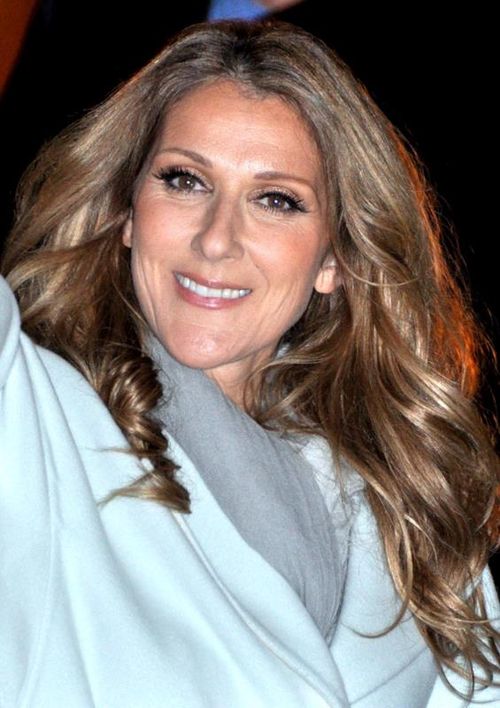
Celine Dion
Description
Céline Marie Claudette Dion (born 30 March 1968) is a Canadian singer. Referred to as the "Queen of Power Ballads", Dion's powerful, technically skilled vocals and commercially successful works have had a significant impact on popular music.
Born into a large family in Charlemagne, Quebec, Dion was discovered by her future manager and husband, René Angélil, and emerged as a teen star in her home country with a series of French-language albums during the 1980s. She gained international recognition by winning the 1988 Eurovision Song Contest, where she represented Switzerland with the song "Ne partez pas sans moi". Dion went on to release twelve English-language albums, including The Colour of My Love (1993), Falling into You (1996), Let's Talk About Love (1997), and All the Way... A Decade of Song (1999), all of which rank among the best-selling albums in history. Her catalog of high-charting tracks includes "Beauty and the Beast", "The Power of Love", "Think Twice", "To Love You More", "Because You Loved Me", "It's All Coming Back to Me Now", "All by Myself", "I'm Your Angel", "That's the Way It Is", "I'm Alive", and "My Heart Will Go On" – the theme for the 1997 film Titanic, which is the second best-selling single by a woman in history.
Dion continued releasing French-language albums between each English record, with D'eux (1995) becoming the best-selling French-language album of all time. During the 2000s, she built her reputation as a successful live performer with A New Day... on the Las Vegas Strip (2003–2007), the highest-grossing concert residency of all time, and the Taking Chances World Tour (2008–2009), one of the highest-grossing concert tours of the 2000s. Los Angeles Times named her the top-earning artist of the decade, with combined album sales and concert revenue exceeding $747 million. In 2022, Dion canceled her tour due to a diagnosis with stiff-person syndrome.
With over 200 million records sold worldwide, Dion is the best-selling Canadian recording artist, the best-selling French-language artist, and one of the best-selling musical artists of all time. Her accolades include 5 Grammy Awards, 20 Juno Awards and a recognition from the International Federation of the Phonographic Industry for selling over 50 million albums in Europe. Seven of her albums have sold at least 10 million copies worldwide, the second most among women in history. She was ranked among the greatest women in music by VH1 and the greatest voices in music by MTV. Dion is one of the highest-grossing touring artists in history and the second woman to accumulate US$1 billion in concert revenue. One of the wealthiest musicians in the world, Forbes ranked her the highest-paid female musician of 1997, 1998, 2004, and 2006. She received honorary doctorates in music from the Berklee College of Music and the Université Laval.
Dion was born in Charlemagne, Quebec, 24 kilometres (15 mi) northeast of Montreal, the youngest of 14 children of Thérèse (née Tanguay, 1927–2020), a homemaker, and Adhémar Dion (1923–2003), a butcher, both of French descent. As the youngest of 14 children, Dion grew up wearing hand-me-downs and sharing a bed with several sisters. As a baby, she slept in a drawer instead of a crib to save money. She was bullied at school and called "Vampire" due to her teeth and skinny frame. Local tabloids even dubbed her "Canine Dion" in the teenage years of her career. She often spoke of running home from school to play music in the basement with her brothers and sisters. "I detested school", she would later write in her autobiography. "I had always lived surrounded by adults and children a lot older than me. I learned everything I needed to know from them. As far as I was concerned, real life existed around them." Dion's eldest sister was already in her twenties, married, and pregnant with her first child at the time that Dion's mother, Thérèse, was pregnant with Dion.
Dion was raised a Roman Catholic in a poor but, by her own account, happy home in Charlemagne. Music had always been a major part of the Dion family, and she was named after the song "Céline", which French singer Hugues Aufray had recorded two years before her birth. On 13 August 1973, she performed publicly for the first time at her brother Michel's wedding, singing Christine Charbonneau's "Du fil, des aiguilles et du coton". She continued to perform with her siblings in her parents' small piano bar called Le Vieux Baril, "The Old Barrel".
She suffered a number of accidents as a young child, including an incident at five years old when she was struck by a car as her father and brother Clément looked on. She was hospitalized briefly with a concussion. From an early age, she had dreamed of being a performer. In a 1994 interview with People, she recalled, "I missed my family and my home, but I don't regret having lost my adolescence. I had one dream: I wanted to be a singer." As a child in Quebec, Dion participated in Girl Guide programs as a member of Girl Guides of Canada.
At age 12, she collaborated with her mother and her brother Jacques to write and compose her first song, "Ce n'était qu'un rêve", whose title translates as "It Was Only a Dream" or "Nothing But A Dream". Michel sent the recording to music manager René Angélil, whose name he discovered on the back of a Ginette Reno album. Angélil was moved to tears by Dion's voice and decided to make her a star. In 1981, he mortgaged his home to fund her first record, La voix du bon Dieu, which later became a local No. 1 hit and made her an instant star in Quebec. Her popularity spread to other parts of the world when she competed in the 1982 Yamaha World Popular Song Festival in Tokyo and won the musician's award for "Top Performer" as well as the gold medal for "Best Song" with "Tellement j'ai d'amour pour toi".
By 1983, in addition to becoming the first Canadian artist to receive a gold record in France for the single "D'amour ou d'amitié" ("Of Love or of Friendship"), Dion had also won several Félix Awards, including "Best Female performer" and "Discovery of the Year". Further success came when she represented Switzerland in the 1988 Eurovision Song Contest with the song "Ne partez pas sans moi" and won the contest by a close margin in Dublin. At age 18, after seeing a Michael Jackson performance, Dion told Angélil she wanted to be a star like Jackson. Though confident in her talent, Angélil realized her image needed to be changed for her to be marketed worldwide. She withdrew from the spotlight for a number of months, during which she underwent dental surgery to improve her appearance, and was sent to the École Berlitz in 1989 to improve her English. In 1989, during a concert on the Incognito tournée, she injured her voice. She consulted the otorhinolaryngologist William Gould, who gave her an ultimatum: have immediate surgery on her vocal cords or do not utilize them at all for three weeks. Dion chose the latter and underwent vocal training with William Riley.
Two years after she learned English, Dion made her debut into the Anglophone market with Unison (1990), the lead single having originally been recorded by English singer Junior in 1983 and later Laura Branigan. She incorporated the help of producers including Vito Luprano and David Foster. The album was largely influenced by 1980s soft rock music and quickly found a niche within the adult contemporary radio format. Unison also hit the right notes with critics: Jim Farber of Entertainment Weekly wrote her vocals were "tastefully unadorned", and she never attempted to "bring off styles that are beyond her". Stephen Thomas Erlewine of AllMusic declared it "a fine, sophisticated American debut". Singles from the album included "(If There Was) Any Other Way", "The Last to Know", "Unison", and "Where Does My Heart Beat Now", a mid-tempo soft-rock ballad made prominent use of the electric guitar. The latter became her first top-ten hit on the U.S. Billboard Hot 100, peaking at number four. In 1991, Dion was a featured soloist on "Voices That Care", a tribute to American troops fighting in Operation Desert Storm.
Her real international breakthrough came when she duetted with Peabo Bryson on the title track to Disney's animated film Beauty and the Beast (1991). It became her first top-ten hit in the UK and her second top-ten hit in the US. The song earned its songwriters an Academy Award for Best Song and gave Dion her first Grammy Award for Best Pop Performance by a Duo or Group with Vocal. "Beauty and the Beast" served as the lead single from her 1992 self-titled album, which, like her debut, had a strong pop rock influence combined with elements of soul and classical music. Owing to the success of the lead-off single and her collaborations with David Foster and Diane Warren, the album was even more well-received commercially than Unison; it was certified diamond in Canada and double platinum in the U.S. The album's second single "If You Asked Me To" (a cover of Patti LaBelle's song from the 1989 movie Licence to Kill) became her first number-one single in Canada and peaked at number four on the U.S. Billboard Hot 100.
Also during this time, Dion released the Francophone album Dion chante Plamondon. The album consisted mostly of covers, but featured four new songs: "Des mots qui sonnent", "Je danse dans ma tête", "Quelqu'un que j'aime, quelqu'un qui m'aime", and "L'amour existe encore". It was originally released in Canada and France between 1991 and 1992, then later received an international release in 1994, the first French Celine Dion album to do so. "Un garçon pas comme les autres (Ziggy)" became a smash hit in France, reaching No. 2 and being certified gold. In Quebec, the album was certified Gold the day it was released.
By 1992, Unison, Celine Dion, and numerous high-profile media appearances had propelled Dion to superstardom in North America. She had achieved one of her main objectives: wedging her way into the Anglophone market and achieving fame. However, while she was experiencing rising success in the U.S., her French fans in Canada criticized her for neglecting them. She would later rebuff these criticisms at the 1991 Félix Awards show, where, after winning "English Artist of the Year", she openly declined the award. She asserted she was—and would always be—a French, not an English, artist. Indeed, she speaks English with a noticeable Quebec French accent to this day. Apart from her commercial success, there were also changes in her personal life, as Angélil, who was 26 years her senior, transitioned from manager to lover. However, the relationship was kept a secret as they both feared the public would find it inappropriate.
Thanks to Wikipedia for this content
 Thanks to Sven
for the idea of this Favorite
March 31, 2025
Thanks to Sven
for the idea of this Favorite
March 31, 2025
 Herbertseemn
Herbertseemn
 Flora
Flora
 Sofia García
Sofia García
 Sven
Sven
 Jane Smith
Jane Smith
 Yuki Tanaka
Yuki Tanaka
 NARYTHY86368NEYHRTGE
NARYTHY86368NEYHRTGE
 Daniel Martinez
Daniel Martinez
 Omar Hassan
Omar Hassan
 Freja Lindström
Freja Lindström
 Ingrid
Ingrid
 Yarik
Yarik
 Abena
Abena
 Hugo van Dijk
Hugo van Dijk
 Luca Rossi
Luca Rossi
 Nadiya
Nadiya
 Hiroshi
Hiroshi
 Sarah Wilson
Sarah Wilson
 Laura Moore
Laura Moore
 Liam
Liam